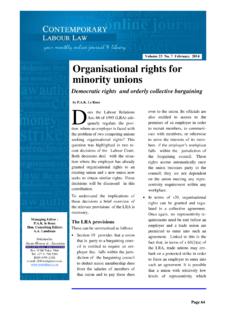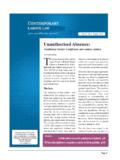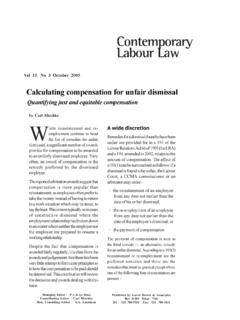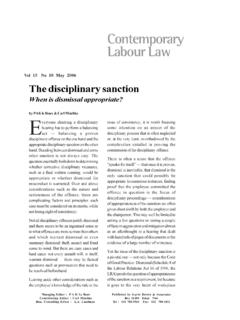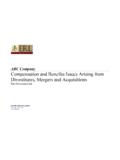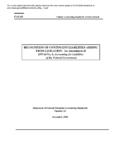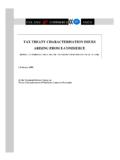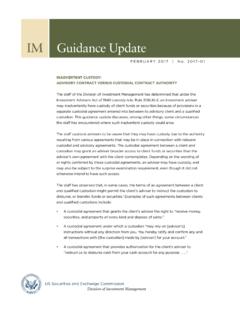Transcription of Claims for compensation arising from strikes and lockouts
1 Page 11 Contemporary Labour Law Vol. 23 No. 2 September 2013 I n the recent Tim Mills Memorial Talk published in CLL (Vol 23 No 1) Adv Myburgh SC, made the point that one of the areas where the Labour Court may be prepared to adopt a more activist approach to discourage unprotected or violent strikes is when considering Claims for compensation instituted against un-ions in terms of s 68(1)(b) of the La-bour Relations Act, 66 of 1995 (LRA). This section envisages that persons who suffer loss as a result of an un-protected strike or lock-out can insti-tute Claims for compensation against the union, employees or employer concerned.
2 In the few cases dealing with this type of claim the Labour Court has awarded relatively small amounts as compensation . He suggests that La-bour Court Judges should be willing to award more substantial amounts as compensation when dealing with un-protected strikes . In this contribution we discuss the provisions of s 68(1)(b). We also briefly consider the possibility that common law Claims for damages may also be instituted in certain cir-cumstances. Common law Claims In terms of common law principles an employer who suffers a loss as a result of a strike has a potential delictual claim against the union and/or the employees concerned in order to recover this loss.
3 (For our purposes a delict can be described as an inten-tional or negligent and wrongful act or omission of a person which causes loss to another person.) The same principle applies to acts or omissions committed during the course of a strike such as malicious damage to property and assault. An employer or other person who suffers loss as a re-sult of these actions may be able to institute a delictual claim for dam-ages to recover this loss. In many cases it may be easier to succeed with such a delictual (or even contractual claim) against the actual strikers or the person(s) who maliciously damaged the property or assaulted another person.
4 The reason for this is that it may be difficult to Claims for compensation arising from strikes and lockouts Common law and the LRA by le Roux Managing Editor : le Roux Hon. Consulting Editor: Landman Published by Box 31380 Tokai 7966 Tel: +27 21 788 5560 ISSN-1995-218X e-mail: Volume 23 No. 2 September 2013 Locking out non-union members p18 Contemporary Labour Law Vol. 23 No. 2 September 2013 Page 12 hold a union liable for the actions of its members. See in this regard the decision of the Labour Court in Mondi Ltd (Mondi Kraft Division) v Chemical Energy Paper Printing Wood & Al-lied Workers Union & Others (2005) 26 ILJ 1458 (LC).
5 On the other hand, a claim against in-dividual employees also has its disadvantages, not the least of which is that an individual employee will usually not have the resources to compensate the plaintiff. In addition, and at least in the case of a claim arising from participation in strike ac-tion, there must be some doubt that a court will be prepared to hold an individual employee liable for the total loss suffered as a result of a strike. Because the purpose of a strike (ie to put eco-nomic pressure on an employer in order to com-pel it to comply with a demand) would be under-mined if the employer were to be permitted to re-cover the losses it has suffered, s 67 of the LRA prohibits such Claims if the strike complies with the provisions of the LRA and is therefore pro-tected.
6 Similarly, an employee who is prevented from working as part of a protected lock-out may also not claim her salary from her employer. This protection also applies to actions in contem-plation of, and in furtherance of, a protected strike, actions that do not constitute a refusal to work but that take place during the course of the strike. This is the effect of s 67(2) which reads as fol-lows ; (2) A person does not commit a delict or a breach of contract by taking part in (a) a protected strike or a protected lock-out; or (b) any conduct in contemplation or in fur-therance of a protected strike or a protected lock-out.
7 In addition 67(6) provides that (6) Civil legal proceedings may not be in-stituted against any person for (a) participating in a protected strike or a protected lock-out; or (b) any conduct in contemplation or in fur-therance of a protected strike or a protected lock-out. These protections also apply to picketing activity that complies with the requirements set in s 69 of the LRA. However, any actions in contemplation or furtherance of a strike that constitute criminal offences do not enjoy protection - see s 67(8). This means, for example, that an employer whose property is damaged as a result of the intentional actions of employees during the course of a pro-tected strike could recover this loss on the basis that the action of damaging the property consti-tutes the criminal offence of malicious damage to property.
8 Section 68 Section 68 of the LRA deals with the legal conse-quences that flow from an unprotected strike or lock-out. It contains no prohibition of Claims to recover a loss suffered as a result of an unpro-tected strike or lock-out presumably on the basis that an employer, trade union, or employee that has failed to comply with the not very onerous provisions of the LRA should not be protected against such Claims . Section 68(1)(b) Claims In addition to not providing protection against Claims , s 68 also provides for a claim for com-pensation that can be utilised in the case of an un-protected strike or lock-out. It gives the Labour Court exclusive jurisdiction to order the payment of just and equitable compensation for any loss attributable to the strike or lock-out, or any loss attributable to conduct in contemplation or fur-therance of such a strike or lock-out.
9 It reads as follows - 68. Strike or lock-out not in compliance with this Act. (1) In the case of any strike or lock-out, or any conduct in contemplation or in further-ance of a strike or lock-out, that does not comply with the provisions of this Chapter, the Labour Court has exclusive jurisdic-tion (a) .. (b) to order the payment of just and equitable compensation for any loss at-tributable to the strike or lock-out, or conduct, having regard to (i) whether (aa) attempts were made to comply with the provisions of this Chapter and the ex- Page 13 Contemporary Labour Law Vol. 23 No.
10 2 September 2013 tent of those attempts; (bb) the strike or lock-out or conduct was premeditated; (cc) the strike or lock-out or conduct was in response to unjustified conduct by an-other party to the dispute; and (dd) there was compliance with an order granted in terms of paragraph (a); (ii) the interests of orderly collective bar-gaining; (iii) the duration of the strike or lock-out or conduct; and (iv) the financial position of the employer, trade union or employees respectively. There have been very few decisions interpreting and applying this section and its interpretation and application is not without some uncertainty.
